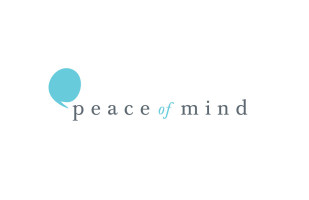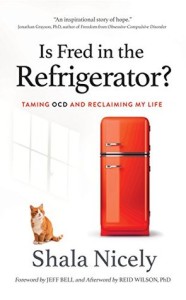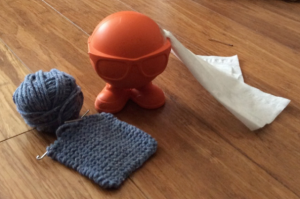
Is Fred in the Refrigerator? Taming and Reclaiming My Life by Shala Nicely, LPC
In the eight years sinc e I discovered exposure and response prevention therapy (ERP), the evidence-based treatment for OCD, I’ve developed an arsenal of ERP-enhancing tools to strengthen my recovery. The following excerpt from my new book, Is Fred in the Refrigerator? Taming and Reclaiming My Life, introduces two of these tools that you can use immediately to strengthen your own OCD recovery.
e I discovered exposure and response prevention therapy (ERP), the evidence-based treatment for OCD, I’ve developed an arsenal of ERP-enhancing tools to strengthen my recovery. The following excerpt from my new book, Is Fred in the Refrigerator? Taming and Reclaiming My Life, introduces two of these tools that you can use immediately to strengthen your own OCD recovery.
The first is the personification of my OCD. When my OCD is being whiny, I see it as a little orange ball with big feet and sunglasses, waddling along behind me dragging a sodden tissue, crying about how the world is about to end. When it’s better behaved, it turns it back on me and quietly knits away on a tiny blue scarf. The second tool is the belief that the universe is a friendly place—not one that is out to get me—and this tool is an exposure in and of itself.
Join me now as my OCD and I read Jeff Bell’s book When in Doubt, Make Belief during a cross country flight to Los Angeles for the 2014 International OCD Foundation conference. You’ll learn why personifying my OCD and choosing to believe I do nothave a target on my back are two of my cornerstone recovery tools:
I was a couple of pages into Chapter Four of Jeff’s book about what “making belief” meant when OCD piped up again, talking over the voice of the pilot who was warning us of turbulence ahead.
I don’t like Jeff. His book is stupid. I think we should stop reading it.
I turned my head to look at my disorder, its little arms crossed in defiance as it stood resolutely on my shoulder.
 “That’s rude, OCD,” I said. “And because you said that, I’m going to keep going.”
“That’s rude, OCD,” I said. “And because you said that, I’m going to keep going.”
Hmpf, we’ll see about that, it threatened, trying to jump down onto the book to get in the way of what I was reading, but I blocked its path with my highlighter and read the next sentence: “Albert Einstein is said to have remarked that the single most important decision any of us will ever have to make is whether or not to believe that the universe is friendly.”
I felt the plane shake a little, a gentle rumbling under my seat.
I read the quote again and then, a few lines down, Jeff’s assertion that “no belief is more significant than the way we choose to view our world.”
OCD was still trying to jump onto Jeff’s book, so I pushed it firmly back up onto my shoulder and highlighted all of what I’d just read, then read the words once more.
I could choose to believe that the universe is friendly?
The plane lurched from side to side, the promised turbulence coming to fruition, but I kept reading, my eyes glued to the pages as the book shook in my hands. My OCD started to pace on my shoulder, ignoring the turbulence and grumbling ever more loudly. It was no wonder that my OCD was doing its best to keep me from reading, because both Jeff and Einstein were saying I didn’t have to believe my monster.
They weren’t saying bad things didn’t happen. After all, Jeff was a radio news anchor, so he shared troubling events happening all over the world on a daily basis. He also wasn’t saying that choosing to believe the universe is friendly would suddenly mean only good things would happen. Instead, he was suggesting that for every example of an unfriendly universe, anyone could come up with a counterexample of a friendly universe, and vice versa. The “reality” of the tone of life was unprovable, so we could choose what to believe. Thus, said another Einstein quote a paragraph down from the first: “There are only two ways to live your life. One is as though nothing is a miracle. The other is as though everything is.”
When I’d performed Fred the previous year [as the keynote speaker at the International OCD Foundation conference], I’d concluded the story of The Accident with, “I have some scars that you can’t see. Scars buried deep within my mind. Because my mom and I almost died that day, and my brain learned the world was a very dangerous place.” It was a belief I’d taken for granted: that I had no choice but to protect myself from the inevitable perils of life.
Jeff was saying it was an OCD-empowering mistake to ignore the possibility Einstein’s words offered.
“I don’t have to see the world as dangerous,” I whispered to myself as I put the book down, patches of rough air causing the cup of Coke sitting on my seatmate’s tray table to hiss and fizz. I stared out the window in wonder at this paradigm shift. “I can choose to believe the universe is friendly.”
My OCD, who had started to jump up and down belligerently on my shoulder, as if it were the one causing the turbulence, came completely unhinged upon hearing my words.
It is NOT! it screamed.
“Yes. Yes, it is,” I said, testing this new paradigm for how to drop the hypervigilance and live life without an undercurrent of fear.
You cannot say that! my OCD screeched.You are putting us in jeopardy! Only hypervigilant people stay safe. Only people who don’t feel too happy. Saying the universe is friendly is letting down your guard. It’s asking for trouble! You are going to kill us! It started blubbering.
I handed my OCD a tissue, patted it on its little orange head as the plane shook again, knocking my disorder off its clown-like feet as it plopped heavily on my shoulder.
“I don’t care, OCD. We are going to try this. I’m going to choose to believe the universe is friendly.”
After a few days of trying on my new belief at the conference, of doing the not-for-the-faint-of-heart exposure of letting down my guard and telling myself the world wasn’t out to get me, my OCD’s tantrums subsided, and I began to feel better. Less hypervigilant. More able to be in the present moment. More like I was enjoying life. As if, for the first time, the bull’s-eye on my back had magically disappeared.
By Saturday evening of the conference, I’d come to understand the power inherent in this simple change in belief to remedy a decades-old, OCD-enabling perspective.
Choosing to believe the universe is friendly is a foundational exposure affecting how we approach not only therapy and recovery, but life itself. As Reid Wilson, PhD explains in the Afterword to Fred, acting on this belief is the essence of what exposure is all about—behaving like what OCD is telling you doesn’t matter. By personifying my OCD, I hear its “voice” as distinct from my own, making it easier to recognize its desires for comfort, certainty, and control so I can then choose to seek out the opposite: discomfort, uncertainty, and letting go. After all, as Susan David says in her brilliant TED Talk, ‘The gift and power of emotional courage,” discomfort is the price of admission to a meaningful life.
If you’d like to learn more about the tools I use to keep my OCD tame and knitting, including self-compassion, Shoulders Back, and my new Rule #1, pick up a copy of Is Fred in the Refrigerator? Taming and Reclaiming My Life today!
Excerpt copyright © 2018 Shala Nicely. All rights reserved.
